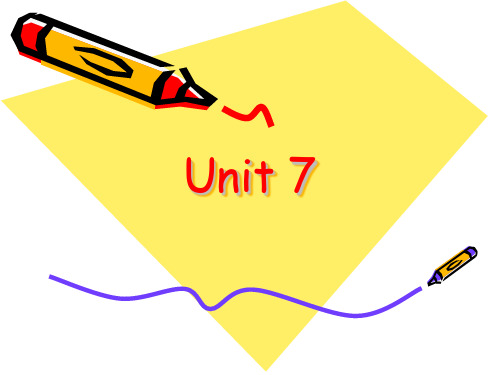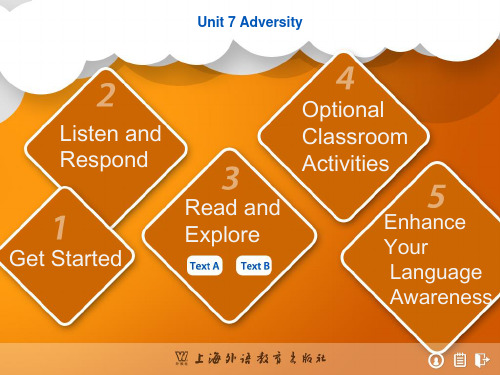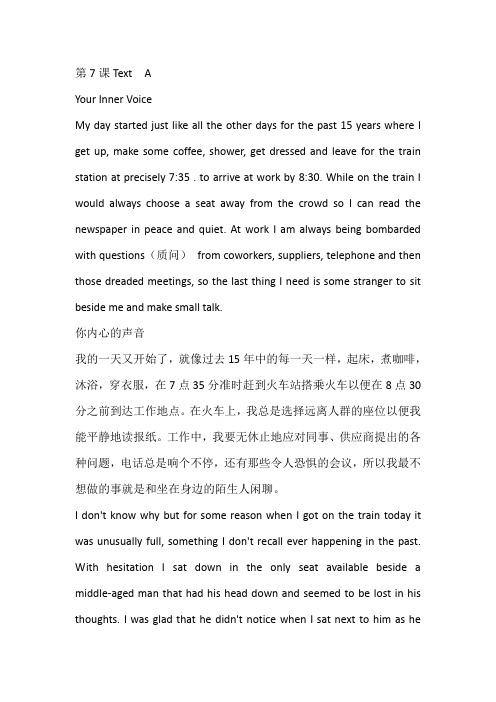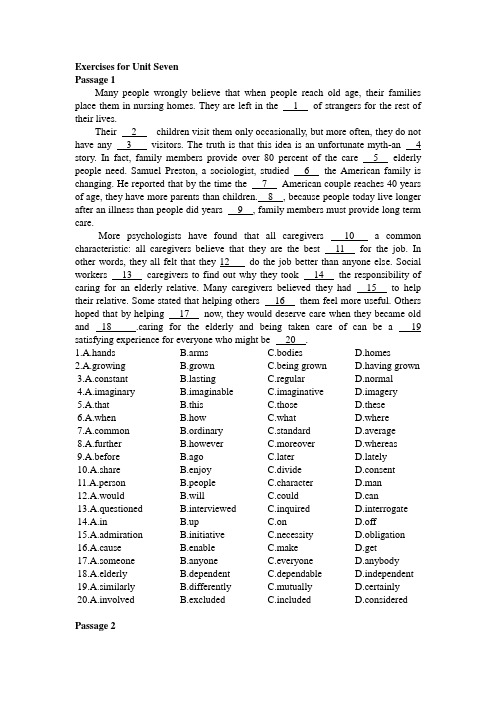新世纪英语专业综合英语第二册unit7课后练习答案
(外教社)全新版大学英语综合教程第二册第七单元课后练习答案unit 7 book 2

Unit7 Learning about EnglishPart II Reading TaskComprehensionContent QuestionPair Work1.It has borrowed and is still borrowing massively from other languages. Today it has anestimated vocabulary of over one million words.2.They don’t like borrowing fo reign words. They try to ban words from English.3.Old English or Anglo-Saxon English.4.The Germanic tribes brought it to the British Isles in the 5th century.5.They are usually short and direct.6.They use words derived from Old English.7.An English judge in India noticed that several words in Sanskrit closely resembled somewords in Greek and Latin. A systematic study later revealed the Indo-European parent language.8.Greek, Latin, Sanskrit, English, etc.9.There were three languages competing for use in England.10.Words from Greek and Roman classics came into the English language.11.The great principles of freedom and rights of man were born in England, then the Americanscarried them forward.12.No. English is and has always been the tongue of the common people. There should not beany fence around it to protect its so-called purity.Text OrganizationWorking On Your Own1.Part One: Massive borrowing from other languages is a major feature of the English language. Part Two: the history of the English language from the Indo-European parent language to modern English.Part Three: Tolerance, love of freedom, and respect for the rights of others---these qualities in the English-speaking people explain the richness of their language.2.Paras. 10-11: Germanic tribes came to settle in Britain and brought Anglo-Saxon words---Old English.Para. 12: The Christian religion enriched English with words from Greek and Latin.Para. 13: the Vikings from Scandinavia came with words from Old Norse.Para. 14: the Norman Conquest---French influence.Para. 15: The European renaissance and the printing pressbrought many new words from Latin and Greek.Para. 16: The American revolution---the emergence of a new variety---Amercan English. Language Sense Enhancement1.(1)judge(2)resembled(3)systematic (4)descended(5)lost to us(6)come up with(7)assume(8)established (9)drifted(10)became known asVocabulary I1.1)Strictly speaking2)drifted3)resembles4)invaded5)is conquered6)fascinating 7)snack8)put; into practice9)source10)climate11)surrendered12)were; aroused2.1)an absolute necessity rather than a luxury.2)is a valuable addition to the football team.3)will get out of control, if the firemen do not arrive within ten minutes.4)Alternative but to go via Vancouver to get to Seattle.5)Declared all beef imports will be banned for the next six months as an emergencymeasure to stop the spread of mad disease.3.1)systematic; have invented; to a very real extent; mysteries2)to establish; to be modified/modifying3)tolerance towards; strike out; enrichII.Synonyms1.a)wish b)wish c)want d)want/wish 2.a)skin b)hide/skin c)hide d)skin3.a)raise/rear b)raise c)rear/raise d)raise4.a)royalb)kingly/royal c)sovereignd)royal/kinglyage1.Indeed2.though3.Frankly4.Moreover5.To my knowledge6.however7.nevertheless8.Yet9.instead10.in other wordsComprehensive Exercises I.cloze1.(1)fascinating(2)tolerance(3)invented(4)addition (5)ban(6)corrupt(7)out of control(8)influenced(9)elite(10)came up with(11)establishing(12)Massive(13)sources (14)enrich 2.(1)early(2)similar(3)source(4)observation (5)examine(6)features(7)declared(8)stronger(9)accident(10)sprungII.Translation1.1)Many small businesses have sprung up in the city since the new policy went into effect.2)On hearing the news, she smiled briefly, and then returned to her habitual frown.3)He paused for effect, then said: “We can reach/enter these markets through newchannels.”4)The addition of a concert hall to the school will help it nourish young musical talents.5)We have no way to protect our personal liberties until we have established a sovereignstate. / We can’t protect our personal liberties unless we, first of all, establish a sovereignstate.2.Though how the English language came into existence remains a mystery to many people, linguists believe that English and most other European languages have descended from a common source: the Indo-European parent language. English was first spoken by the Anglo-Saxons who invaded England in the fifth century. They passed onto us the basic vocabulary of English. In over fifteen centuries of its development, English has enriched itself by massive borrowing. As British immigrants landed in America and established the United States as an independent nation, a new variety was added to the English language: American English. Though some people worry that the language is running out of control, many native speakers of English take pride in the tolerance of their language.。
新世纪综合教程2第二版Unit7答案

Keys for Unit 6VocabularyI. 1. inner nature; indispensable quality; the most important part 2. sins leading to damnation. (In Christianity the phrase specifically refers to “the seven deadly sins sins””: pride, covetousness, lust, anger, gluttony, envy and sloth) 3. making you think or act wrongly 4. tasks traditionally required of students 5. far from enough II. 1. define 2. irrelevant 3.correspond to 4. flunked 5. rather 6. makes a point of 7. apt to 8. go round III. 1. removal 2. climatic 3.salvation 4. proficiency 5. assumption 6. normally 7. resentment 8.disastrous IV IV. . B, D, C, C, B, D, B, D V . 1. balanced,compensated 2. unconventional 3. abundant, plentiful 4. evaluated, assessed 5. average 6. essentially, basically 7. lightly, frivolously 8. temporarily VI. 1.international 2. translate 3. circumference 4. neoclassical 5. conform 6. antisocial 7. undo 8. outshine GrammarI. 1. Unfortunately, we have run out of stock. 2. Hopefully, the report will go out to shareholders no later than June 1. 3. Oddly enough, he did not raise any objection to the plan. 4. Rightly, you returned the money. 5. Luckily, this had attracted the attention of TV network executives. 6. Fortunately, all went well. 7. Strangely enough, the burglar didn’t take the diamond away. II. 1. It was right that they protested against it. /They were right to have protested against it. 2. It was foolish that the boy didn’t say a single word. /It was foolish of the boy not to say a single word. /The boy was foolish not to say a single word. 3. It was wise that John sent the man away. /It was wise of John to have sent the man away. /John was wise to have sent the man away. 4. It was sad that the storm destroyed the entire tobacco crop. 5. It was remarkable that Mrs Jensen consulted her lawyer. 6. It is regrettable that James refuses to speak. 7. 7. It It It is is is lucky lucky lucky that that that my my my assistant assistant assistant has has has arranged arranged arranged for for for the the the matter matter matter to to to be be be considered considered considered by by by an an an ad ad ad hoc hoc working party. 8. It is hoped that a proposal will be ready in time for our next meeting. III. 1. which, when, by which 2. on which 3. That 4. for whom 5. with whom 6. to whom 7. of which 8. at which IV IV. 1.where, where . 1.where, where 2. what, which 3. what 4. why 5. where 6. When 7. why 8. which, which, what V . 1. However 2. Whatever 3. whatever 4. Wherever 5. whichever 6. whoever 7. However 8. whenever, whenever Translation1. 不管我们的标准是什么,不管我们的标准是什么, 这个标准现在提高了,结果使你对自己没能得到更高的分数而感到失望。
新世纪英语专业综合教程2答案UNIT7

Ⅱ.
• 5. Anyone who has come to a foreign country for the first time is apt to find everything around him both strange and interesting. • 6. The football fans were very disappointed at the performance of the players of both teams. • 7. Never take what he says at face value. Think it over yourself. • 8. The doctor’s words removed his fears about the operation.
Ⅳ.
• 1.B. play the role of 担任...角色 sauna 桑拿浴 health farm (常设于乡村用来减肥的)健身庄园 • 2. D. reduced in degree to one’s dismay 令人沮丧的是 set loose引起, 惹起, 招致 level off (使)变得平坦,(使)变得平整; 达到稳定 • 3. C. written text manuscript 原稿;手稿 cassette tape 盒式录音带 • 4. C. became bankrupt have no head for在某 方面缺少天分 • 5. B. keep retain 保持, 保留 • 6. D. impedes妨碍;阻止 accelerate加速, 促进 • 7. B. critical紧要的, 关键性的 • 8. D. lack
• 2. It is important to see the fact that although they differ in their class status and educational background, human beings are essentially the same. First of all they are, biologically speaking, constructed in the same way, and then they all share the feelings of fear and joy, and also the common experience of suffering and achieving. This commonality has bound them together. All of them will regard wars, diseases, and disasters both private and public as unfortunate big events in their life time.
新世纪大学英语教材_第二版_综合教程2_unit7

Quotes
Watching and Discussion
Smooth seas do not make skillful sailors.
— African proverb
Interpretation:
Sailing on rough seas, sailors are constantly faced with all kinds of hostile conditions. In their struggle against adversities, they can acquire survival skills in time. Similarly, the difficulties of life should make us better, not bitter. In the process of dealing with problems and difficulties, we can become more experienced in life. Therefore, instead of panicking or complaining in the face of adversity, we should see it as a challenge as well as a chance to improve our abilities.
Unit 7 Adversity
Listen and Respond
Optional Classroom Activities
Get Started
Read and Explore
Enhance Your Language Awareness
Get Started
Unit 7
英语二第七单元课后答案及参考译文

第7课Text AYour Inner VoiceMy day started just like all the other days for the past 15 years where I get up, make some coffee, shower, get dressed and leave for the train station at precisely 7:35 . to arrive at work by 8:30. While on the train I would always choose a seat away from the crowd so I can read the newspaper in peace and quiet. At work I am always being bombarded with questions(质问)from coworkers, suppliers, telephone and then those dreaded meetings, so the last thing I need is some stranger to sit beside me and make small talk.你内心的声音我的一天又开始了,就像过去15年中的每一天一样,起床,煮咖啡,沐浴,穿衣服,在7点35分准时赶到火车站搭乘火车以便在8点30分之前到达工作地点。
在火车上,我总是选择远离人群的座位以便我能平静地读报纸。
工作中,我要无休止地应对同事、供应商提出的各种问题,电话总是响个不停,还有那些令人恐惧的会议,所以我最不想做的事就是和坐在身边的陌生人闲聊。
I don't know why but for some reason when I got on the train today it was unusually full, something I don't recall ever happening in the past. With hesitation I sat down in the only seat available beside a middle-aged man that had his head down and seemed to be lost in his thoughts. I was glad that he didn't notice when I sat next to him as hejust continued to look down towards the floor.那天我搭乘火车时,不知道出于什么原因火车上异常拥挤,这是过去不曾发生过的。
英语二第七单元课后答案及参考译文

英语二第七单元课后答案及参考译文Unit 7: Answers and Reference TranslationExercise 1:1. C 9. A2. B 10. B3. A 11. C4. B 12. C5. C 13. A6. A 14. B7. B 15. A8. AExercise 2:1. protested 6. industrialization2. sneezed 7. fulfilling3. adventures 8. encouraged4. believed 9. administrative5. promised 10. achievementExercise 3:1. went fishing 6. are collecting2. had finished 7. doesn't need3. will take 8. haven't been4. has been studying 9. will have left5. have already watched 10. were playingReference Translation:Unit 7 focuses on vocabulary development, sentence patterns, and grammar rules related to various topics. It is important to practice and review the content to reinforce learning outcomes. In this article, we will provide the answers and a reference translation for the exercises in Unit 7.Exercise 1 tests your comprehension of the unit's reading materials. The correct answers are as follows:1. C2. B3. A4. B5. C6. A7. B8. A9. A10. B11. C12. C13. A14. B15. AExercise 2 focuses on vocabulary usage. Here are the answers:1. protested2. sneezed3. adventures4. believed5. promised6. industrialization7. fulfilling8. encouraged9. administrative10. achievementExercise 3 involves the application of different grammar tenses. The correct answers are:1. went fishing2. had finished3. will take4. has been studying5. have already watched6. are collecting7. doesn't need8. haven't been9. will have left10. were playingWe hope that these answers and translations have helped you better understand and evaluate your progress in Unit 7. Remember to review the exercises thoroughly and seek further clarification from your instructor if needed. Practice and consistency are key to improving your English skills. Good luck!。
新通用大学英语综合教程2(第2册)U7课后答案及课件(第七单元unit07),高等教育出版社

1.A person’s instincts have little effect on his actions.
2.Environment is important in determining a person’s behavior and personality. 4.The behaviors’ view correctly explains how we act.
Exercise C
Check whether each statement is true (T) or false (F).
True 1. The nature theory explains our personality clearly. 2. The nurture theory can fully explain why we behave in certain way. 3. Both nature and nurture theories can explain people’s characters simply. □ □ □ □ □ □ False □
Extended Exercises Checkpoint
Lesson 1
3
Lead-in Listening
3
Speaking
Reading
3
Writing
Lead-in
Sitcom: What Do You Think of This Color? Scene 1
3
Exercise A Exercise B
(
)Байду номын сангаас
(√ )
( (
)
(
)
3.Biological reasons have a strong influence on how we act. (
新世纪大学英语2unit 7 网上练习及答案

Exercises for Unit SevenPassage 1Many people wrongly believe that when people reach old age, their families place them in nursing homes. They are left in the 1 of strangers for the rest of their lives.Their 2 children visit them only occasionally, but more often, they do not have any 3 visitors. The truth is that this idea is an unfortunate myth-an 4 story. In fact, family members provide over 80 percent of the care 5 elderly people need. Samuel Preston, a sociologist, studied 6 the American family is changing. He reported that by the time the 7 American couple reaches 40 years of age, they have more parents than children. 8 , because people today live longer after an illness than people did years 9 , family members must provide long term care.More psychologists have found that all caregivers 10 a common characteristic: all caregivers believe that they are the best 11 for the job. In other words, they all felt that they 12 do the job better than anyone else. Social workers 13 caregivers to find out why they took 14 the responsibility of caring for an elderly relative. Many caregivers believed they had 15 to help their relative. Some stated that helping others 16 them feel more useful. Others hoped that by helping 17 now, they would deserve care when they became old and 18 .caring for the elderly and being taken care of can be a 19 satisfying experience for everyone who might be 20 .1.A.hands B.arms C.bodies D.homes2.A.growing B.grown C.being grown D.having grown3.A.constant sting C.regular D.normal4.A.imaginary B.imaginable C.imaginative D.imagery5.A.that B.this C.those D.these6.A.when B.how C.what D.wheremon B.ordinary C.standard D.average8.A.further B.however C.moreover D.whereas9.A.before B.ago ter tely10.A.share B.enjoy C.divide D.consent11.A.person B.people C.character D.man12.A.would B.will C.could D.can13.A.questioned B.interviewed C.inquired D.interrogate14.A.in B.up C.on D.off15.A.admiration B.initiative C.necessity D.obligation16.A.cause B.enable C.make D.get17.A.someone B.anyone C.everyone D.anybody18.A.elderly B.dependent C.dependable D.independent19.A.similarly B.differently C.mutually D.certainly20.A.involved B.excluded C.included D.considered Passage 2Shopping habits in the United States have changed greatly in the last quarter of the 20th century. 1 in the 1900s most American towns and cities had a Main Street. Main Street was always in the heart of a town. This street was 2 on both sides with many 3 businesses. Here, shoppers walked into stores to look at all sorts of merchandise: clothing, furniture, hardware, groceries. 4 , some shops offered 5 .These shops included drugstores, restaurants, shoe repair stores, and barber or hairdressing shops. 6 in the 1950s, a change began to 7 .Too many automobiles had crowded into Main Street 8 too few parking places were 9 shoppers. Because the streets were crowded, merchants began to look with interest at the open spaces 10 the city limits. Open space is what their car driving customers needed. And open space is what they got 11 the first shopping centre was built. Shopping centers, or rather malls, 12 as a collection of small new stores 13 crowded city centers. 14 by hundreds of free parking space, customers were drawn away from 15 areas to outlying malls. And the growing 16 of shopping centers led 17 to the building of bigger and better stocked stores. 18 the late 1970s, many shopping malls had almost developed into small cities themselves. In addition to providing the 19 of one stop shopping, malls were transformed into landscaped parks, 20 benches, fountains, and outdoor entertainment.1.A.As early as B.Early C.Early as D.Earlier2.A.built B.designed C.intented D.lined3.A.varied B.various C.sorted D.mixed up4.A.Apart from B.However C.In addition D.As well5.A.medical care B.food C.cosmetics D.services6.A.suddenly B.Abruptly C.Contrarily D.But7.A.be taking place B.take place C.be taken place D.have taken place8.A.while B.yet C.though D.and then9.A.available for B.available to ed by D.ready for10.A.over B.from C.out of D.outside11.A.when B.while C.since D.then12.A.started B.founded C.set up anized13.A.out of B.away from C.next to D.near14.A.Attracted B.Surprised C.Delighted D.Enjoyed15.A.inner B.central C.shopping D.downtown16.A.distinction B.fame C.popularity D.liking17.A.on B.in turn C.by turns D.further18.A.By B.During C.In D.Towards19.A.cheapness B.readiness C.convenience D.handiness20.A.because of B.and C.with D.providedKeys: Passage 1 ABCAA BDCBA BCBCD CABCAPassage 2 BDBCD DBABD AABAD CBACC。
- 1、下载文档前请自行甄别文档内容的完整性,平台不提供额外的编辑、内容补充、找答案等附加服务。
- 2、"仅部分预览"的文档,不可在线预览部分如存在完整性等问题,可反馈申请退款(可完整预览的文档不适用该条件!)。
- 3、如文档侵犯您的权益,请联系客服反馈,我们会尽快为您处理(人工客服工作时间:9:00-18:30)。
Unit 7Text comprehensionI. Decide which of the following best states the author’s purpose of writing.BII. Judge, according to the text, whether the following statements are true or false.1.T2. T3. T4. F5. FIII. Answer the following questions.1.The answer to this question is mainly based on paragraph 2, in which the author implies thatthe cause of the student’s disappointment is to a large extant social. In a society where the importance of wining is overemphasized, it is considered shameful to be a loser. What’ more, prosperity in the present is assumed to ensure one’s salvation in the future. In this general social climate, therefore, a B student will naturally feel disappointed.2.Refer to paragraph 4. A grade is just a symbol, which is supposed to reflect the level of astudent’s performance,and the student’s performance is assumed to correspond to his knowledge. But the student may have acquired more or less knowledge out of the course than the grade indicates. Therefore a grade may be misleading.3.His attitude toward the current school curriculum is critical. Refer to Paragraph 5, in which hementions a number of important characteristics of humans such as courage, kindness, wisdom, and good humor. These are not included in the current school curriculum. Obviously our schools have neglected character building of the students.4.The technique the instructor used was to make a clear distinction between the student as aclassroom performer and the student as a human being. A poor grade, at best, indicates that the student is a poor classroom performer.5.Social labels,including grades,in the author’s opinion,are basically irrelevant andmisleading. But on the other hand, they are necessary, because human society is complex and diversified, thus distinctions among its members have to be made, and such distinctions have to be indicated by various labels. In this way the author’s view is not self-contradictory. It actually reveals two sides of the problem.IV. Explain in your own words the following sentences.1.Being unsuccessful in one’s life and career and financially disadvantaged is regarded asshameful or even sinful because in this world people tens to think that only those who are successful now can be saved from evil in the future.2.It is important to see the fact that although they differ in their class status and educationalbackground,human beings are essentially the same.First of all they are,biologically speaking, constructed in the same way, and then they all share the feelings of fear and joy, and also the common experience of suffering and achieving. This commonality has bound them together. All of them regard wars, disease and disasters both private and public as unfortunate big events in their life time.VocabularyI. Explain the underlined part in each sentence in your own words.1. inner nature; indispensable quality; the most important part2. In Christianity the phrase specially refers to “the seven deadly sins”: pride, covetousness, lust, anger, gluttony, envy, and sloth.3. making you think or act wrongly4. tasks traditionally required of students5. far from enough.II. Fill the blank in each sentence with a word taken from the box in its appropriate form. 1. define 2. irrelevant 3. correspond to 4. flunked 5. rather 6. makes a point of 7. apt to 8.go roundIII. Fill the blanks with the appropriate forms of the given words.1. removal2. climatic3. salvation4. proficiency5. assumption6. normally7. resentment8. disastrousIV. Choose the word or phrase that can replace the underlined part in each sentence without changing its original meaning1. B2. D3. C4. C5. B6. D7. B8. DV. Give a synonym or an antonym of the word underlined in each sentence in the sense it is used.1. balanced, compensated2. unconventional3. abundant, plentiful4. average5.essentially, basically6.lightly, frivolously7. temporarilyVI. Write in each space one word that has the same prefix as underlined in each given word.1. international2. translate3. circumference4. neoclassical5. conform6. antisocial7. undo8. outshineGrammarI. Rewrite the following sentences using proper disjuncts.1. Unfortunately, we have run out of stock.2. Hopefully, the report will go out to shareholders no later than June 1.3. Oddly enough, he did not raise any objection to the plan.4. Rightly, you returned the money.5. Luckily, this had attracted the attention of TV network executives.6. Fortunately, all went well.7. Strangely enough, the burglar didn’t take the diamond away.II. Rewrite the following according to the models.1.It was right that they protested against it. / They were right to have protested against it.2.It was foolish that the boy did not say a single word. / It was foolish of the boy not to say asingle word. / The boy was foolish not to say a single word.3.It was wise that John sent the man away. / It was wise of John to have sent the man away. /John was wise to have sent the man away.4.It was sad that the storm destroyed the entire tobacco crop.5.It was the remarkable that Mrs. Jensen consulted her lawyer.6.It is regrettable that James refuses to speak.7.It is lucky that my assistant has arranged for the matter to be considered by an ad hoc workingparty.8.It is hoped that a proposal will be ready in time for our next meeting.III. Fill in each blank with a proper relative word. Use “preposition+ relative word” if necessary.1. which; when; by which2. on which3. that4. for whom5. with whom6. to whom7. of which8. at whichIV. Put in where, when why, which or what.1. where; where2. what; which3. what4. why5. where6. when7. why8. which; which; whatV. Complete the following sentences with the appropriate words in the box.1. However2. Whatever3. whatever 4wherever 5. whichever 6.whoever7. However 8. whenever; wheneverVI. Make sentences of your own after the sentences given below, keeping the italicized parts in your sentences.1. e.g. For some parents, sending their children to the best universities is not the most importantthing—it’s the only thing.For anyone who wants to find a position in this joint-venture, a good command of English, both oral and written, is not the most important thing—it’s the only thing.2. e.g. Strangely enough, he does not like such fast food as KFC and hamburgers as mostteenagers do. Nor does he like meat dishes. Rather, he prefers fish and vegetables. Surprisingly enough, he has never been abroad. Nor has he even had a teacher who is a native speaker.Rather, he has acquired his native-like accent all by imitating native speakers on tapes. TranslationI. Translate the following sentences into Chinese.1. 不管我们的标准是什么,这个标准现在提高了,结果使你自己是对自己没能得到更高的分数而感到失望。
